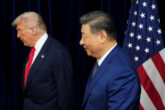November 30, 2022
Xi Jinping in His Own Words
In October, at 20th National Party Congress of the Chinese Communist Party (CCP), General Secretary Xi Jinping set himself up for another decade as China’s most powerful leader since Mao Zedong, replaced his most economically literate Politburo colleagues with a phalanx of loyalists, and enshrined the Stalinist-Maoist concept of “struggle” as a guiding principle in the Party Charter. The effect was to turn the page on “reform and opening,” the term the CCP uses to describe the economic liberalization that began in the late 1970s and led to the explosive growth of the Chinese economy in the past four decades.
The contest between democracies and China will increasingly turn on the balance of dependence; whichever side depends least on the other will have the advantage.
At the party congress, Xi was granted a third term as the CCP’s top leader—an unprecedented development in the contemporary era and a crucial step in his effort to centralize authority. But perhaps even more significant was the way the congress served to codify a worldview that Xi has been developing over the past decade in carefully crafted official party communications: Chinese-language speeches, documentaries, and textbooks, many of which Beijing deliberately mistranslates for foreign audiences, when it translates them at all. These texts dispel much of the ambiguity that camouflages the regime’s aims and methods and offer a window into Xi’s ideology and motivations: a deep fear of subversion, hostility toward the United States, sympathy with Russia, a desire to unify mainland China and Taiwan, and, above all, confidence in the ultimate victory of communism over the capitalist West. The end state he is pursuing requires the remaking of global governance. His explicit objective is to replace the modern nation-state system with a new order featuring Beijing at its pinnacle.
Read the full article from Foreign Affairs.
More from CNAS
-
Chinese Maker of Bitcoin-Mining Machines Is a Security Threat, Says Expert
Bloomberg News reports that a Chinese manufacturer, Bitmain Technologies Ltd, that sells most of the world’s Bitcoin-mining machines — including 16,000 of them to a venture ba...
By David Feith
-
Indo-Pacific Security / Energy, Economics & Security
North Korea’s Provocations, Power Plays, and Shifting AlliancesTensions on the Korean Peninsula have reached a new and dangerous threshold. President Lee Jae Myung is warning of a real risk of accidental military clashes, as the situation...
By Dr. Go Myong-Hyun
-
Indo-Pacific Security / Energy, Economics & Security
How to Win the Economic War with ChinaTrump's approach to China has run aground, giving Beijing unprecedented advantage in the economic conflict....
By Edward Fishman & Julian Gewirtz
-
Indo-Pacific Security / Technology & National Security
Sharper: Tech + ChinaRecent talks between President Donald Trump and Chinese Communist Party General Secretary Xi Jinping placed a spotlight on emerging technologies, from high-end chips to minera...
By Charles Horn & Sevi Silvia




